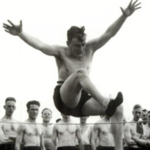Degeneratie en dressuur. Natuurgeneeswijze, vegetarisme en naturisme als ontwerpen voor een moderne samenleving, 1890-1950
DOI:
https://doi.org/10.18352/bmgn-lchr.6083Keywords:
Health careAbstract
Degeneration and dressage. Natural cures, vegetarianism and naturalism as building blocks for a modern society, 1890-1950
Aloïs van Son, a natural therapist from Antwerp, presided over a successful medical practice in the 1920s en 1930s and strongly believed that his search for a drug-free ‘natural’ therapy was rooted in a much broader struggle against a ‘degenerate’ society that had lost touch with nature. It was only by changing oneself (Selbstreform), Van Son preached, that the modern individual could heal society. In this article, a crucial autobiographical confession by this headstrong and charismatic therapist will help to deepen our understanding of the ‘life reform’ movement (Lebensreform) as it developed between 1890 and 1950 not only in societies of natural therapists, vegetarians and naturists in Germany, but also among their Belgian counterparts. My aim is not, as has been done before, to provide an accurate qualification of the ‘modern’ or ‘antimodern’ character of the exterior ideology of this movement. On the contrary; I will try to lay bare the interior dynamics of ‘life reform’ practices. I will argue that opponents like Van Son found in the ascetic experience that these practices not only provided a refuge from but also gave access to modern reality.
Downloads

Downloads
Published
Issue
Section
License
Authors who publish with this journal agree to the following terms:
a) Authors retain copyright and grant the journal right of first publication with the work simultaneously licensed under a Creative Commons Attribution 4.0 International (CC BY 4.0) that allows others to share the work with an acknowledgement of the work's authorship and initial publication in this journal.
b) Authors are able to enter into separate, additional contractual arrangements for the non-exclusive distribution of the journal's published version of the work (e.g., post it to an institutional repository or publish it in a book), with an acknowledgement of its initial publication in this journal.
c) Authors are permitted to post their work online (e.g., in institutional repositories or on their website) prior to and during the submission process.
Authors are explicitly encouraged to deposit their published article in their institutional repository.











